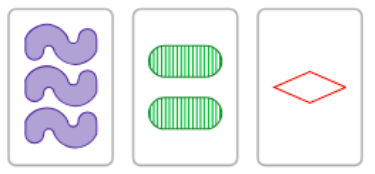
If you are like me, you have played the game SET and have probably been perplexed at how quickly some people can play the game! Even as the game is quite easy to explain, it takes some time to build various strategies and pattern recognition to play the game effectively. If you have never heard of SET, don’t fret because we will soon review its layout. For my final masters project at Texas A&M University, we had the autonomy to research any higher-level mathematical topic and I felt SET would be a great venue to tap into some deeper mathematics. Little did I know how truly complex and elegant SET really is with connections to combinatorial geometry, finite affine geometry, and vector spaces over finite fields, some of these problems still open in research-level mathematics. All of these topics (and more) are included in a great resource I highly recommend for some summer reading. Check out The Joy of Set by McMahon, et al. to dig deeper into what is presented below.